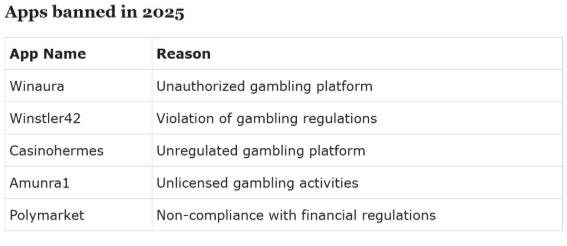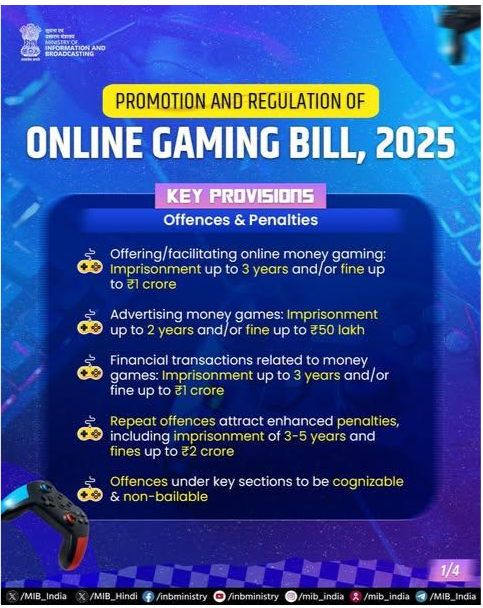Promotion & Regulation of Online Gaming Act, 2025 Introduction
- The Parliament of India has recently passed the Promotion & Regulation of Online Gaming Bill, 2025, a landmark legislation aimed at creating a structured legal framework for the country’s booming online gaming sector.
- This Act seeks to promote e-sports and social gaming while restricting high-risk gambling-based games, balancing industry growth with player protection.

What are the Key Provisions of the Online Gaming Regulation Act, 2025?
- Categorization of Online Games: The Act clearly defines three categories of online games:
-
-
- E-Sports: Officially recognized under the National Sports Governance Act, 2025. Competitions are skill-based, with outcomes determined by strategy, dexterity, and performance. Betting, wagering, or monetary stakes are not involved.
- Online Social Games: These are recreational or educational games, often played for fun or learning purposes. No monetary rewards or expectations of profit are involved, although players may pay subscription or access fees. Notably, e-Sports are explicitly excluded from this definition. The Online Gaming Act further brings within its ambit all “Persons“, a term that extends to include individuals, companies, and foreign entities offering services to Indian users.
- Real Money Games (RMGs): Games where money, credits, or convertible tokens are staked, with the expectation of financial gain. This definition applies irrespective of whether the game involves skill, chance, or both, marking a major shift from earlier judicial distinctions. The Act imposes a complete ban on RMGs, covering platforms like fantasy sports, poker, and rummy.
-
- Restrictions on Real Money Games: The legislation strictly prohibits all activities related to online money games:
-
-
- Offering or Operating RMGs – Complete ban on any RMG platform in India.
- Advertising – Criminalizes any form of promotion, including indirect advertising, of RMGs.
- Financial Transactions – Banks and other financial institutions are barred from processing payments or transactions linked to RMGs.
-
- Promotion of E-Sports and Social Gaming: Unlike RMGs, the Act actively supports skill-based and social games:
-
-
- Recognition of E-Sports – E-sports can now be officially registered as competitive sports. It empowers the Central government to frame guidelines for the promotion and development of e-Sports, which include establishing academies and research centers, implementing incentive schemes for e-Sports innovation and coordinating with State governments and sporting federations.
-
- Establishment of a Central Regulatory Authority: A dedicated central authority will be formed to oversee the categorization, registration, and regulation of online gaming platforms:
-
- Empowered to issue codes of conduct and guidelines.
- Responsible for classification of games and resolving public grievances.
- Provides a transparent system for compliance monitoring.
- It must be noted that in 2023, the Ministry of Electronics and Information Technology introduced provisions under the Information Technology (Intermediary Guidelines and Digital Media Ethics Code) Rules, 2021, for the appointment of self-regulatory bodies (“SRBs ”) to oversee online games. However, no such SRBs have been appointed till date.
- Penalties and Enforcement: The Act prescribes stringent penalties to ensure compliance:
-
- Operators – Up to 3 years in prison, a fine up to ₹1 crore, or both for facilitating RMGs.
- Advertisers – Up to 2 years imprisonment and ₹50 lakh fine for promoting such games.
- Financial Institutions – Up to 3 years imprisonment and ₹1 crore fine for processing RMG transactions.
- Warrantless Powers – Authorized officers can conduct searches and arrests without a warrant in suspected cases.
- Cognizable and Non-Bailable Offenses – All RMG-related violations are classified under Bhartiya Nagarik Suraksha Sanhita (BNSS).

Why India Needed the Online Gaming Regulation Act, 2025?
- Preventing Financial Frauds and Money Laundering:
-
-
- Real-money gaming (RMG) platforms had increasingly become conduits for financial crimes, tax evasion, and money laundering. Some reports even linked them to terror financing.
- A Parliamentary Panel Report (2023) noted that online gaming portals were being misused to fund terror activities.
- The Financial Intelligence Unit (2022) highlighted Rs 2000 crore in tax evasion by online gaming firms.
- Investigations revealed misuse of mule accounts and cryptocurrency wallets, as seen in certain Chinese apps like FIEWIN.
- The Act ensures strict monitoring to prevent these platforms from being exploited for illicit financial activities.
-
- Protecting Vulnerable Groups:
-
-
- Unregulated real-money games have led to addiction, mental health issues, suicides, and family breakdowns, particularly among youth.
- Government research indicates that algorithms in many online gaming platforms are designed so that no user can consistently win, effectively exploiting players.
- The Union Minister highlighted that nearly 45 crore people have been impacted, incurring financial losses of over ₹20,000 crore due to online gaming platforms.
- By banning RMGs and restricting manipulative gaming practices, the Act aims to shield vulnerable groups from social and financial harm.
-
- Closing Regulatory Gaps and Strengthening Enforcement: Before the Act, there was no unified legal framework for online gaming in India, which led to:
-
-
- Inconsistent regulations across states.
- Loopholes that allowed illegal betting platforms to flourish.
- Challenges in extra-territorial enforcement, as many gaming companies operate from offshore jurisdictions.
- The Act creates a centralized and uniform regulatory structure, reducing ambiguities and ensuring effective enforcement across India.
-
- Restricting Financial Transactions for Illegal Gaming:
-
-
- Banks, payment gateways, and other financial institutions were often facilitating transactions linked to illegal betting and RMG platforms, complicating enforcement.
- The law now explicitly prohibits and monitors such transactions, cutting off the financial channels that fuel unlawful gaming operations.
-
- Providing Clarity and Encouraging Innovation in Gaming:
-
- Legitimate gaming segments like e-sports, social games, and skill-based games were previously affected due to regulatory uncertainty.
- Entrepreneurs lacked clear guidance on compliance, limiting growth and innovation.
- The Act distinguishes between harmful RMGs and safe skill-based games, fostering a secure environment for players while promoting innovation and investment in legitimate gaming platforms.
Challenges Arising from the Online Gaming Regulation Act, 2025
- Ignoring the Skill vs. Chance Distinction: One of the major criticisms is that the Act does not differentiate between games of skill and games of chance:
-
- Courts in India have historically recognized skill-based games like chess, poker, and fantasy sports as legitimate businesses.
- By imposing a blanket ban on all real-money games, the law raises constitutional concerns under:
- Article 14 – right to equality before the law.
- Article 19(1)(g) – right to trade or carry out business.
- This lack of clarity may lead to legal challenges and uncertainty for businesses operating skill-based gaming platforms.
-
- Collapse of Revenue Sector: The real money gaming segment generated ₹16,500 crore in 2023. This sector was projected to grow to ₹26,500 crore by 2028, but a complete ban could lead to its collapse.
- Threat to Industry and Startups: The online gaming ecosystem in India is a rapidly growing sector, supporting 2–4 lakh jobs and over 2,000 startups:
-
-
- The ban jeopardizes foreign direct investment (FDI) and investor confidence, potentially leading to losses exceeding ₹25,000 crore.
- The total ecosystem, estimated at ₹2 lakh crore, faces a significant slowdown if key platforms are shut down.
-
- Risk of Tax Revenue Loss:
-
-
- Closure of regulated RMG platforms can lead to a loss of estimated ₹20,000 crore annually in GST and other tax revenues.
- The government may also lose control over monitoring financial transactions within the gaming sector.
-
- Shift to Offshore and Illegal Platforms:
-
-
- Users may migrate to unregulated offshore platforms or dark web sites due to the domestic ban.
- This exposes players to higher risks of fraud, data theft, and money laundering, undermining the Act’s core objective of protecting citizens.
-
- Reduced Investment Confidence:
-
-
- Between 2019 and 2023, domestic and foreign investments amounting to ₹22,931 crore were made in the gaming sector.
- A complete ban places these investments at risk, leading to potential withdrawal and loss of investor confidence.
-
- Weak Consumer Protection Mechanisms:
-
-
- Regulated Indian platforms previously offered grievance redressal systems, dispute resolution, and responsible gaming tools.
- A ban could eliminate these protections, leaving users vulnerable to exploitation.
-
- Implementation and Enforcement Challenges:
-
-
- Policing digital platforms across borders is complex, especially with offshore servers and VPN usage.
- Warrantless search and seizure powers granted to authorities may lead to potential misuse or overreach.
- Monitoring and blocking illegal platforms requires substantial technical and human resources.
-
- Central-State Jurisdiction Conflicts:
-
- Under the Seventh Schedule of the Constitution, Entries 34 & 62 of the State List assign regulation and taxation of betting and gambling to state governments. The only Central law was the Public Gambling Act, 1867 (“PGA“), which focused on physical gaming houses and was unfit for digital platforms. Although the PGA allowed for games of “mere skill” to be exempt from consideration, with the rise of online gaming, these gaps became stark.
- States like Nagaland and Sikkim introduced licensing laws for online skill games, but their effect remained territorially limited.
- By overriding state laws, the Act intrudes on state legislative competence, creating a potential constitutional conflict.
- States may challenge the central law in court, citing federalism concerns.
Way Forward
- Clear Distinction Between Skill-Based and Chance-Based Games:
-
-
- Amend the blanket ban to differentiate between skill-driven games and games of pure chance.
- Recognize skill-based games, including chess, fantasy sports, and strategy games, as legitimate business activities, as supported by judicial precedents.
- Permit regulated skill-based platforms to operate under strict guidelines, ensuring they contribute to employment generation, innovation, and tax revenues.
-
- Strengthening the Regulatory Authority:
-
-
- Establish a well-resourced central regulatory body tasked with oversight, categorization, and compliance monitoring.
- Define transparent processes for game registration, audits, and dispute resolution.
- Empower the authority to classify games, enforce codes of conduct, and monitor consumer safety, incorporating inputs from industry stakeholders and civil society.
-
- Robust Consumer Protection and Awareness:
-
-
- Launch public awareness campaigns targeting gaming addiction, financial fraud, and cybersecurity risks, particularly among youth and vulnerable groups.
- Introduce clear grievance redressal mechanisms, including protocols for refunds, balance protection, and data privacy safeguards.
- Encourage responsible gaming practices to reduce the social harms linked to real-money gaming.
-
- Enable Lawful Payments and Monitor Transactions:
-
-
- Allow payment gateways and financial institutions to facilitate transactions for regulated, legitimate games under strict monitoring.
- Strengthen mechanisms to block illegal and offshore platforms, reducing the risk of fraud and money laundering.
- Collaborate with RBI, FinTech companies, and payment processors to detect suspicious activity and prevent financial crimes.
-
- Enhance State-Centre Coordination:
-
- Involve state governments in rule-making and enforcement to resolve jurisdictional conflicts.
- Create consultative committees comprising state representatives, industry stakeholders, and civil society to ensure harmonized regulation.
- Periodically review and adapt policies to address technological changes, evolving business models, and emerging social concerns.















